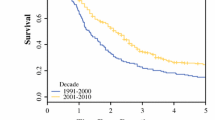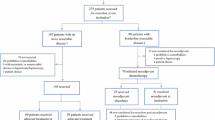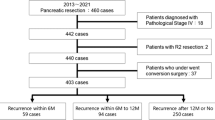Abstract
Background
Data on long-term actual survival in patients with surgically resected pancreatic ductal adenocarcinoma (PDAC) are limited. The aim of this study was to evaluate the actual 5-year disease-specific survival (DSS) and post-recurrence survival (PRS) in patients who underwent pancreatectomy for PDAC.
Methods
Data from patients who underwent upfront surgical resection for PDAC between 2009 and 2014 were analyzed. Exclusion criteria included PDAC arising in the background of an intraductal papillary mucinous neoplasm and patients undergoing neoadjuvant therapy. All alive patients had a minimum follow-up of 60 months. Independent predictors of PRS, DSS, and survival > 5 years were searched.
Results
Of the 176 patients included in this study, 48 (27%) were alive at 5 years, but only 20 (11%) had no recurrence. Median PRS was 12 months. In the 154 patients after disease recurrence, independent predictors of shorter PRS were total pancreatectomy, G3 tumors, early recurrence (< 12 months from surgery), and no treatment at recurrence. Median DSS was 36 months. Independent predictors of DSS were CA19-9 at diagnosis > 200 U/mL, total pancreatectomy, N + status, G3 tumors and perineural invasion. Only the absence of perineural invasion was a favorable independent predictor of survival > 5 years.
Conclusion
More than one-quarter of patients who underwent upfront surgery for PDAC were alive after 5 years, although only 11% of the initial cohort were cancer-free. Long-term survival can also be achieved in tumors with more favorable biology in an upfront setting followed by adjuvant chemotherapy.


Similar content being viewed by others
References
Siegel RL, Miller KD, Jemal A. Cancer statistics, 2020. CA Cancer J Clin. 2020;70:7–30.
Ferrone CR, Pieretti-Vanmarcke R, Bloom JP, et al. Pancreatic ductal adenocarcinoma: long-term survival does not equal cure. Surgery. 2012. https://doi.org/10.1016/j.surg.2012.05.020.
Ferrone CR, Brennan MF, Gonen M, et al. Pancreatic adenocarcinoma: the actual 5-year survivors. J Gastrointest Surg. 2008. https://doi.org/10.1007/s11605-007-0384-8.
Groot VP, Gemenetzis G, Blair AB, et al. Defining and predicting early recurrence in 957 patients with resected pancreatic ductal adenocarcinoma. Ann Surg. 2019. https://doi.org/10.1097/SLA.0000000000002734.
Katz MHG, Wang H, Fleming JB, et al. Long-term survival after multidisciplinary management of resected pancreatic adenocarcinoma. Ann Surg Oncol. 2009. https://doi.org/10.1245/s10434-008-0295-2.
He J, Ahuja N, Makary MA, et al. 2564 resected periampullary adenocarcinomas at a single institution: trends over three decades. HPB. 2014. https://doi.org/10.1111/hpb.12078.
Rich JT, Neely JG, Paniello RC, et al. A practical guide to understanding Kaplan–Meier curves. Otolaryngol Head Neck Surg. 2010. https://doi.org/10.1016/j.otohns.2010.05.007.
Strobel O, Lorenz P, Hinz U, et al. Actual five-year survival after upfront resection for pancreatic ductal adenocarcinoma. Ann Surg. 2020. https://doi.org/10.1097/SLA.0000000000004147.
Bengtsson A, Andersson R, Ansari D. The actual 5-year survivors of pancreatic ductal adenocarcinoma based on real-world data. Sci Rep. 2020. https://doi.org/10.1038/s41598-020-73525-y.
Nakagawa K, Akahori T, Nishiwada S, et al. Prognostic factors for actual long-term survival in the era of multidisciplinary treatment for pancreatic ductal adenocarcinoma. Langenbeck’s Arch Surg. 2018. https://doi.org/10.1007/s00423-018-1709-7.
Yamaguchi K. Pancreatic ductal carcinoma derived from IPMN and concomitant with IPMN. Nihon Rinsho. 2015;73:234–9.
Qaderi SM, Dickman PW, de Wilt JHW, et al. Conditional survival and cure of patients with colon or rectal cancer: a population-based study. J Natl Compr Canc Netw. 2020. https://doi.org/10.6004/jnccn.2020.7568.
Klaiber U, Hackert T, Neoptolemos JP. Adjuvant treatment for pancreatic cancer. Transl Gastroenterol Hepatol. 2019. https://doi.org/10.21037/tgh.2019.04.04.
Neoptolemos JP, Palmer DH, Ghaneh P, et al. Comparison of adjuvant gemcitabine and capecitabine with gemcitabine monotherapy in patients with resected pancreatic cancer (ESPAC-4): a multicentre, open label, randomised, phase 3 trial. Lancet. 2017. https://doi.org/10.1016/s0140-6736(16)32409-6.
Neoptolemos JP, Moore MJ, Cox TF, et al. Effect of adjuvant chemotherapy with fluorouracil plus folinic acid or gemcitabine vs. observation on survival in patients with resected periampullary adenocarcinoma: the ESPAC-3 periampullary cancer randomized trial. JAMA. 2012. https://doi.org/10.1001/jama.2012.7352.
Neoptolemos JP, Stocken DD, Bassi C, et al. Adjuvant chemotherapy with fluorouracil plus folinic acid vs. gemcitabine following pancreatic cancer resection: a randomized controlled trial. JAMA. 2010. https://doi.org/10.1001/jama.2010.1275.
Edge S, Byrd DR, Compton CC, et al editors. AJCC cancer staging manual. 7th edn. New York: Springer; 2010.
Verbeke CS, Gladhaug IP. Resection margin involvement and tumour origin in pancreatic head cancer. Br J Surg. 2012. https://doi.org/10.1002/bjs.8734.
Dindo D, Demartines N, Clavien PA. Classification of surgical complications: a new proposal with evaluation in a cohort of 6336 patients and results of a survey. Ann Surg. 2004. https://doi.org/10.1097/01.sla.0000133083.54934.ae.
Bassi C, Marchegiani G, Dervenis C, et al. The 2016 update of the International Study Group (ISGPS) definition and grading of postoperative pancreatic fistula: 11 years after. Surgery. 2017. https://doi.org/10.1016/j.surg.2016.11.014.
Barugola G, Partelli S, Marcucci S, et al. Resectable pancreatic cancer: who really benefits from resection? Ann Surg Oncol. 2009. https://doi.org/10.1245/s10434-009-0670-7.
Gemenetzis G, Groot VP, Blair AB, et al. Incidence and risk factors for abdominal occult metastatic disease in patients with pancreatic adenocarcinoma. J Surg Oncol. 2018. https://doi.org/10.1002/jso.25288.
Huang J, Lok V, Ngai CH, et al. Worldwide burden of, risk factors for, and trends in pancreatic cancer. Gastroenterology. 2020. https://doi.org/10.1053/j.gastro.2020.10.007.
Mohammadian-Hafshejani A. The global, regional, and national burden of pancreatic cancer and its attributable risk factors in 195 countries and territories, 1990–2017: a systematic analysis for the Global Burden of Disease Study 2017. Lancet Gastroenterol Hepatol. 2019. https://doi.org/10.1016/s2468-1253(19)30347-4.
Søreide K, Aagnes B, Møller B, Westgaard A, Bray F. Epidemiology of pancreatic cancer in Norway: trends in incidence, basis of diagnosis and survival 1965–2007. Scand J Gastroenterol. 2010. https://doi.org/10.3109/00365520903358899.
Oettle H, Neuhaus P, Hochhaus A, et al. Adjuvant chemotherapy with gemcitabine and long-term outcomes among patients with resected pancreatic cancer: the CONKO-001 randomized trial. JAMA. 2013. https://doi.org/10.1001/jama.2013.279201.
Søreide K. Neoadjuvant and adjuvant therapy in operable pancreatic cancer: both honey and milk (but no bread?). Oncol Ther. 2021. https://doi.org/10.1007/s40487-020-00136-y.
Conroy T, Hammel P, Hebbar M, et al. FOLFIRINOX or gemcitabine as adjuvant therapy for pancreatic cancer. N Engl J Med. 2018. https://doi.org/10.1056/NEJMoa1809775.
Conlon KC, Klimstra DS, Brennan MF. Long-term survival after curative resection for pancreatic ductal adenocarcinoma: clinicopathologic analysis of 5-year survivors. Ann Surg. 1996. https://doi.org/10.1097/00000658-199603000-00007.
Cleary SP, Gryfe R, Guindi M, et al. Prognostic factors in resected pancreatic adenocarcinoma: analysis of actual 5-year survivors. J Am Coll Surg. 2004. https://doi.org/10.1016/j.jamcollsurg.2004.01.008.
Han SS, Jang JY, Kim SW, Kim WH, Lee KU, Park YH. Analysis of long-term survivors after surgical resection for pancreatic cancer. Pancreas. 2006. https://doi.org/10.1097/01.mpa.0000202953.87740.93.
Schnelldorfer T, Ware AL, Sarr MG, et al. Long-term survival after pancreatoduodenectomy for pancreatic adenocarcinoma is cure possible? Ann Surg. 2008. https://doi.org/10.1097/SLA.0b013e3181613142.
Crippa S, Guarneri G, Belfiori G, et al. Positive neck margin at frozen section analysis is a significant predictor of tumour recurrence and poor survival after pancreatodudenectomy for pancreatic cancer. Eur J Surg Oncol. 2020. https://doi.org/10.1016/j.ejso.2020.02.013.
Kooby DA, Lad NL, Squires MH, et al. Value of intraoperative neck margin analysis during Whipple for pancreatic adenocarcinoma: a multicenter analysis of 1399 patients. Ann Surg. 2014. https://doi.org/10.1097/SLA.0000000000000890.
Datta J, Willobee BA, Ryon EL, et al. Contemporary reappraisal of intraoperative neck margin assessment during pancreaticoduodenectomy for pancreatic ductal adenocarcinoma: a review. JAMA Surg. 2021. https://doi.org/10.1001/jamasurg.2020.5676.
Morales-Oyarvide V, Rubinson DA, Dunne RF, et al. Lymph node metastases in resected pancreatic ductal adenocarcinoma: predictors of disease recurrence and survival. Br J Cancer. 2017. https://doi.org/10.1038/bjc.2017.349.
Honselmann KC, Pergolini I, Fernandez-Del Castillo C, et al. Timing but not patterns of recurrence is different between node-negative and node-positive resected pancreatic cancer. Ann Surg. 2020. https://doi.org/10.1097/SLA.0000000000003123.
Crippa S, Partelli S, Zamboni G, et al. Poorly differentiated resectable pancreatic cancer: is upfront resection worthwhile? Surgery. 2012. https://doi.org/10.1016/j.surg.2012.05.017.
Crippa S, Pergolini I, Javed AA, et al. Implications of perineural invasion on disease recurrence and survival after pancreatectomy for pancreatic head ductal adenocarcinoma. Ann Surg. 2020. https://doi.org/10.1097/SLA.0000000000004464.
Schorn S, Demir IE, Haller B, et al. The influence of neural invasion on survival and tumor recurrence in pancreatic ductal adenocarcinoma: a systematic review and meta-analysis. Surg Oncol. 2017. https://doi.org/10.1016/j.suronc.2017.01.007.
Conroy T, Desseigne F, Ychou M, et al. FOLFIRINOX versus gemcitabine for metastatic pancreatic cancer. N Engl J Med. 2011. https://doi.org/10.1056/NEJMoa1011923.
Suker M, Beumer BR, Sadot E, et al. FOLFIRINOX for locally advanced pancreatic cancer: a systematic review and patient-level meta-analysis. Lancet Oncol. 2016. https://doi.org/10.1016/S1470-2045(16)00172-8.
Peretti U, Cavaliere A, Niger A, et al. Germinal BRCA1-2 pathogenic variants (gBRCA1-2pv) and pancreatic cancer:epidemiology of an Italian patient cohort. ESMO Open. 2021. https://doi.org/10.1016/j.esmoop.2020.100032.
Funding
The PhD Scholarship of Giulia Gasparini and the Research Fellowship of Giulio Belfiori were supported by the Gioja Bianca Costanza Fund, and the research fellowship of Francesca Aleotti was supported by FCSR-Fronzaroli.
Author information
Authors and Affiliations
Corresponding author
Ethics declarations
Disclosures
Giulio Belfiori, Stefano Crippa, Aleotti Francesca, Michele Pagnanelli, Domenico Tamburrino, Giulia Gasparini, Stefano Partelli, Valentina Andreasi, Corrado Rubini, Giuseppe Zamboni, and Massimo Falconi report no conflicts of interests.
Additional information
Publisher's Note
Springer Nature remains neutral with regard to jurisdictional claims in published maps and institutional affiliations.
Supplementary Information
Below is the link to the electronic supplementary material.
SUPPLEMENTARY FIG. 1
DSS of the entire cohort. Median DSS was 36 months for all 176 patients. DSS disease-specific survival
Rights and permissions
About this article
Cite this article
Belfiori, G., Crippa, S., Francesca, A. et al. Long-Term Survivors after Upfront Resection for Pancreatic Ductal Adenocarcinoma: An Actual 5-Year Analysis of Disease-Specific and Post-Recurrence Survival. Ann Surg Oncol 28, 8249–8260 (2021). https://doi.org/10.1245/s10434-021-10401-7
Received:
Accepted:
Published:
Issue Date:
DOI: https://doi.org/10.1245/s10434-021-10401-7




